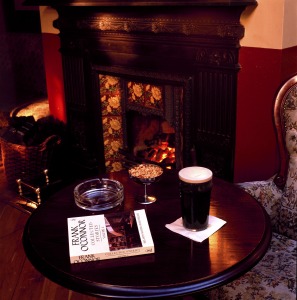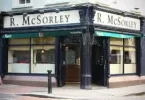The role of the rural pub
‘Locals’ comprise 78.8% of the customers that provide rural pubs with an average weekly turnover of €2,000 according to a recent report commissioned by the Vintners Federation of Ireland.
The role of pubs in creating economic development and social wellbeing in rural Ireland was prepared for the VFI by Dr Ignazio Cabras of the Newcastle Business School (Northumbria University) and Dr Matthew Mount of the Kent Business School at the University of Kent in Canterbury.
Rural pubs’ turnover and expenditure
According to the authors, “At first glance, weekly turnover figures suggest that pubs in rural areas are still thriving, with 72.7% of respondents logging a weekly turnover in the excess of €2,000, 32.7% of which log a weekly turnover of €5,000”.
However the report points out that this figure doesn’t take into account increasing running costs.
“Results show that the majority of pubs were operating on a 60%-plus ratio of costs with regards to turnover, with another 22.6% of pubs operating between the 51-60% ratio bands.
“Further analysis regarding the source of these costs appear to indicate that costs related to employment and services (eg electricity and gas) were the biggest contributor, accounting for an average of 32% of total costs, followed by expenses related to supplies and products (29%), alcohol excises and other taxation (24%), costs related to mortgages and lease (12%) and other unidentified costs (3%),” states the report which indicates that less than 10% of pubs have turnovers of under €1,000 per week.
Unlike turnovers, these costs are rising with 32.4% of survey respondents logging an increase in costs of between 1% and 10% while 28.2% logged a decrease in turnover of between 26% and 50% compared to the previous year.
“Only one out of 10 say that their turnover had remained the same from the previous financial year; even less (6.5%) reported no changes about their business costs.
“This result shows an increasing economic strain on rural pubs that will directly affect their survival,” states the report.
Employment in rural pubs
More than three-quarters of surveyed pubs employ at least one or more staff.
The majority (63.1%) of employees work part-time an average of nine to 12 hours per week with 10.5 hours the ‘midpoint’.
The remaining 36.9% account for full-time employees working on average 36 hours per week.
The report finds that 22.9% – or just over one in five – of rural pubs are solely owner-operated while the rest have one or more staff members (excluding the pub owner or manager).
“However, mean estimations suggest that pubs on average have one full-time and two part-time employees,” it adds.
The survey also finds slightly higher levels of females than males being employed here, adding that rural pubs tend to employ younger employees, with the highest age group being 16-24 year-olds (33%), followed by 25-34 year-olds (27%), 35-44 year-olds (19%) and 44-54 year-olds at 12%.
The lowest employment group rested in the 55-plus age at 9%.
“Salaries calculated on average hourly wage (€/hour) show chefs and kitchen assistants as better-paid occupations (€11.26) and waiters/waitresses as the lowest-paid (€9.46).”
Estimations were calculated on the population of rural pubs as comprised in the VFI database and – based on survey results – these indicate a potential 5,709 jobs created by these businesses of which 2,105 are full-time. In total rural pubs generate about €60.7 million in wages, believe the authors.
Rural pubs & suppliers
The use of suppliers by pubs threw up some interesting results indicating that three in four pubs rarely (32.3%) or never (42.7%) use supermarkets.
“On average, surveyed pubs appear to use local suppliers fairly regularly,” states the report, “In particular, pubs serving food and/or providing overnight accommodation are more likely to make their purchasing locally compared to other types of pubs. Calculations made on responses indicate a total of €2.1 million injected by pubs within their local supply chains with each pub spending approximately €600 a week in local businesses.”
On the other hand specialised retailers for licensed businesses were indicated as the most prominent type of supplier for pubs, with over 70% of respondents using them either often (19.1%) or always (51.3%).
Interviewees also report a general lack of communication with large national suppliers and distributors as well as with government and local authorities on issues affecting their business.
According to the survey responses the prices of beverage supplies and satellite TV channels have also increased in the past decade and now represent an important voice in their budget.
“The situation is complex, on one hand pub owners are somehow forced to buy from large national suppliers like Diageo and Heineken given customers’ high appreciation for their beers and need satellite channels in order to attract customers especially during weeknights. On the other hand, prices related to these products and services appear to be rigid and in the case of satellite channels, do not always guarantee enough profits to be justified.”
A number of publicans during interviews lamented the lack of constructive communication with main national specialised suppliers which prevent them negotiating on prices.
“However, publicans also stated that the demand for beers such as Guinness from their customers is very high and therefore they feel forced to have them in their pubs.”
Calculations made by the researchers appear to indicate that Diageo and Heineken, the main national beer suppliers and distributors, control between 80% and 90% of total draught sold in the Irish on-trade market.
However the report adds that large suppliers support many events and initiatives organised by pubs in Ireland with both financial and logistical resources.
Rural pub as community resource
The social and economic role played by pubs in rural areas of Ireland is significantly valued by local residents. Their closure is strongly associated with the decline of social drinking and increasing levels of alcohol consumption in private premises, fuelled by cheap prices available in the off-licence sector which are perceived by locals as having a detrimental and devastating impact on rural communities.
Publicans also support almost all volunteering initiatives and charity events occurring in villages and rural parishes. Participants of focus groups frequently described publicans as ‘pillars’ and ‘sentinels’ of their communities with pubs functioning as information centres as well as informal job centres.
Improving the offer of public and private transport services at a local level should bring many benefits to pubs and businesses in rural areas. Enhancing public transport would provide an incentive for local residents to socialise.
More taxi companies could be attracted to remote areas through lower prices for licences and faster bureaucratic processes. Financial support from local authorities would help keep taxi-fares affordable, suggests the report.
Future of the pub
Overall, a general pessimistic view was expressed by respondents on the future of rural pubs.
“Almost 90% of respondents predict a continuation of the current situation or further downturn” found the report, “while only 8.1% of respondents were optimistic with regards to future financial performance.”
When asked by the researchers about what the Government and policymakers could do in order to improve the situation of publicans in rural Ireland, three items were raised in the interviews:
- an immediate intervention on prices of alcohol sold in supermarket
- improve transport services in remote areas and
- better communications with publicans when discussing policies and strategies directly affecting them.
“The Irish government should carefully consider the opportunity costs associated with pub closures in remote areas of the country,” concludes the report, “Campaigning in favour of social drinking and supporting rural pubs in fostering and facilitating social involvement would bring a wide range of benefits for local communities and indirectly, to local economies”.
——————————
Methodology
The researchers identified 1,772 businesses meeting the criteria to be classified as a village or rural pub.
The survey was officially launched on 15 June 2013 and the data were collected by means of online and postal surveys.
A total of 293 valid responses were gathered at the end of the data collection, accounting for 16.53% of the total population surveyed.
The researchers decided to conduct 10 in-depth interviews with pub owners and managers.
——————————-









